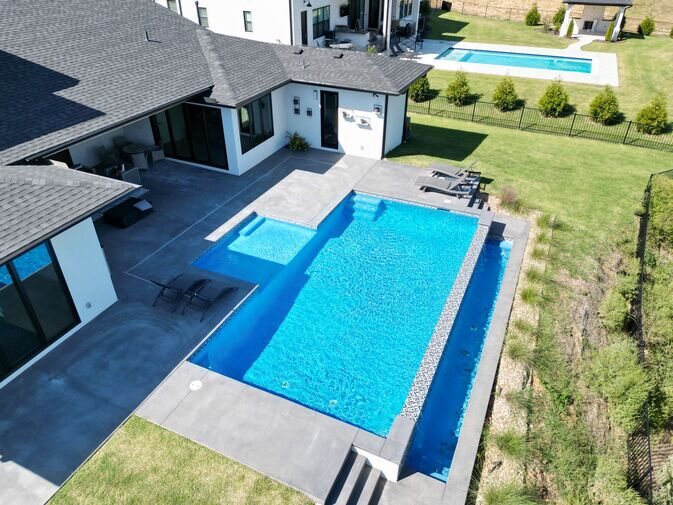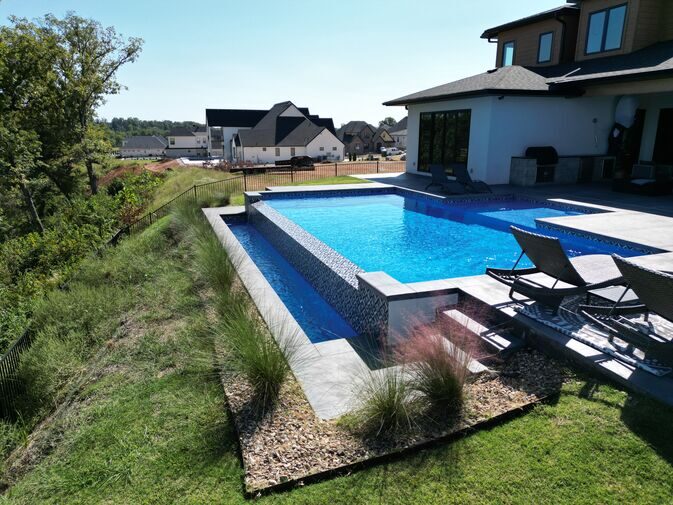Pool leaks may seem small at first, but it can lead to significant problems if left unaddressed. Water loss increases your bills, weakens your pool’s structure, and can damage the surrounding area. In Northwest Arkansas, where hot summers make pools a favorite place to cool off, a leak can also mean more water waste during already dry months.
Leaks can be identified and repaired by recognizing the warning signs, pinpointing the source, and selecting the appropriate repair method before the damage worsens.
How to Tell If Your Pool Has a Leak
Some water loss is normal because of evaporation. However, a pool that loses more than a quarter of an inch per day may have a leak. Knowing the warning signs can help you catch the problem early.
Common Signs of a Pool Leak

- The water level drops quickly even after topping it up
- Wet spots or soggy patches around the pool deck or yard
- Cracks in the pool walls or deck
- Air bubbles coming from the return lines when the pump is running
- Algae growth despite regular cleaning and proper chemical balance
Evaporation vs. Leaks
In the summer, pools naturally lose some water to evaporation, especially in hot climates like Northwest Arkansas. However, evaporation is usually slow and steady. If your pool loses more than half an inch of water in a day or two, it is likely more than just evaporation.
A quick tip is to check if the water loss is faster when the pump is running. That can point to a plumbing or equipment leak.
DIY Pool Leak Detection Methods
If you suspect a leak, you can try a few simple tests before calling a professional. These tests are easy, inexpensive, and can help you narrow down the location of the problem.
The Bucket Test
- Fill a bucket with pool water and place it on a pool step so the water level inside the bucket matches the water level of the pool.
- Mark the water level inside the bucket and on the pool wall.
- Leave it for 24 hours without using the pool.
- Compare the levels. If the pool water level drops below the water in the bucket, there is likely a leak.
The Dye Test
- Turn off the pool pump to keep the water still.
- Squirt a small amount of food coloring or pool dye near suspected leak areas, such as cracks, fittings, or seams.
- Watch if the dye is pulled into the crack or hole.
Check the Equipment
Inspect the pump, filter, heater, and plumbing lines for drips or wet spots. Sometimes, leaks come from loose fittings or worn seals in the equipment rather than the pool shell itself.
Professional Leak Detection Services
While DIY tests can help, professional leak detection offers more accuracy. Experts use tools and techniques that can pinpoint leaks you cannot find on your own.
Common Professional Methods
- Pressure testing: Involves sealing off pool plumbing lines and using air or water pressure to detect breaks or leaks.
- Electronic listening devices: Amplify the sound of water escaping underground or through cracks.
- Specialized cameras: Inspect hard-to-reach areas such as pipes or behind fittings.
How Long Does It Take
Professional leak detection usually takes a few hours, depending on the size of your pool and the complexity of the plumbing.
Typical Cost
In Northwest Arkansas, professional leak detection can cost anywhere from $300 to $1,000, depending on the methods used and the pool size. While it is an extra expense, it can save you from bigger repair bills later.
Common Causes of Pool Leaks
Understanding why leaks happen can help you identify the necessary repairs.
Structural Issues
Concrete pools can develop cracks due to shifting soil, freeze-thaw cycles, or simple wear over time. Even small cracks can cause water to escape.
Plumbing Problems
Pipes under or around the pool may break or come loose due to ground movement or aging materials. Plumbing leaks can be hard to find because they are underground.
Equipment Failures
Pumps, filters, and heaters have seals, gaskets, and connections that can wear out or loosen. These leaks often start small but can become worse over time.
Liner Damage
Vinyl liners can tear or pull away from the pool walls. This is common if the liner is old, has been punctured by sharp objects, or has weakened due to sun exposure.
Repair Options
The right repair depends on the location and severity of the leak.
Minor Repairs
- Vinyl patch kits for small liner tears
- Pool putty or sealants for hairline cracks
- Replacing worn O-rings or pump seals
These repairs can sometimes be done yourself if you are comfortable working with pool materials and equipment.
Major Repairs
- Pipe replacement for damaged underground plumbing
- Resurfacing or replastering for large cracks in concrete pools
- Full liner replacement for severe vinyl damage
Major repairs are best left to professionals since they often require specialized tools and skills.
Cost Breakdown
The cost of fixing a pool leak can vary widely based on the problem and the type of pool you own.
Factors That Affect Cost
- Pool type: concrete, vinyl, fiberglass, inground, or above-ground
- Severity of the leak
- Location of the leak
- Labor rates in Northwest Arkansas
Average Price Ranges in the U.S.
- Minor DIY repairs: $20 to $100 for patch kits or sealants
- Minor professional repairs: $250 to $1,000 for above-ground pools
- Minor professional repairs: $500 to $1,500 for inground pools
- Major repairs like pipe replacement: $1,000 to $5,000
- Full liner replacement: $2,000 to $4,000
- Resurfacing or replastering: $4,000 to $10,000
Leak detection costs also vary. Above-ground pools typically cost $100 to $500, while inground pools average $300 to $1,000.
These are national averages, and your actual price may be lower or higher depending on your location, pool size, and specific repair needs.
Sources:
- HomeGuide – Pool Leak Repair Cost
- Fixr – Swimming Pool Leak Repair Cost
- OCD Pool Maintenance – Average Cost to Fix a Pool Leak
- Angi – Pool Leak Detection Cost
- HomeGuide – Pool Leak Detection Cost
- Poolie – Pool Leak Detection Cost Guide
Preventing Future Leaks
The best way to deal with pool leaks is to prevent them in the first place. Regular maintenance and inspections can catch small issues before they become big problems.
Tips for Prevention
- Check the water level weekly and note any sudden drops
- Inspect the pool shell, deck, and fittings regularly for cracks or wear
- Keep your pool water chemistry balanced to protect surfaces and equipment
- Maintain equipment with regular cleaning and part replacement
- Winterize your pool properly to avoid freeze damage
When to Call a Pool Contractor
If your leak is large, hard to locate, or caused by serious structural or plumbing problems, it is time to call a professional. Delaying repairs can lead to water damage, higher bills, and even the need for complete pool reconstruction.
A reputable pool contractor in Northwest Arkansas will have the tools, training, and experience to find the leak quickly and fix it properly.
Conclusion
A pool leak may seem like a small issue at first, but it can waste water, raise bills, and cause expensive damage if ignored. By knowing the signs of a leak, testing for it, and calling in professionals when needed, you can protect your pool and your budget.
If you are in Northwest Arkansas and need expert help with pool leak inspections or repairs, BC Pools is here to help. Contact us today to schedule a consultation, get a free quote, and keep your pool in great shape all season long.


